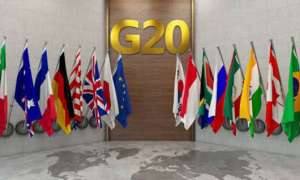
- Biden’s Farewell, Xi’s Spotlight, and Lula’s Global South Agenda
World leaders from the Group of Twenty (G20) gathered on Monday in Rio de Janeiro, Brazil, for a summit that aims to tackle pressing global challenges such as poverty, climate financing, and economic inequality. Hosted by Brazilian President Luiz Inácio Lula da Silva, the summit is taking place at the stunning bayside Museum of Modern Art under tight security following a recent attempted attack on Brazil’s Supreme Court.
This meeting carries additional weight as it coincides with the COP29 climate conference in Azerbaijan, which has stalled on climate financing for developing countries. With uncertainty surrounding future U.S. policies and mounting geopolitical challenges, the eyes of the world are turned to Rio for progress.
U.S. President Joe Biden attends the summit as a “lame duck” leader nearing the end of his presidency, with international leaders already looking ahead to a potential return of Donald Trump to the White House. Biden’s participation caps a final diplomatic tour that included a meeting with Asia-Pacific trading partners in Lima, Peru, and a historic visit to the Amazon rainforest — the first by a sitting U.S. president.
Biden has sought to cement his climate legacy during his remaining time in office. Despite the looming threat of Trump’s possible resurgence and his “America First” policies, Biden insists that the climate progress achieved under his administration will endure.
“Climate change isn’t waiting for political cycles,” Biden said before departing for Rio. “Our actions today will define the planet’s future for generations to come.”
While Biden’s diplomatic farewell has drawn attention, Chinese President Xi Jinping is expected to dominate the summit. Xi has positioned himself as a global statesman and advocate for free trade in stark contrast to Trump’s protectionist approach. China’s clout within the G20 has grown as it champions the interests of developing countries, particularly on issues like infrastructure funding and climate change.
Xi’s presence also underscores the complex dynamics within the G20, as fast-developing nations like China resist pressure from wealthier countries to co-fund global climate initiatives. Chinese officials have emphasized that historical polluters bear the greatest responsibility for financing climate solutions, a position shared by many countries in the Global South.
Brazil’s President Lula da Silva, hosting the summit at age 79, aims to spotlight Global South priorities. A former steelworker who rose from poverty, Lula embodies the struggles of millions worldwide, lending authenticity to his advocacy for marginalized populations.
In his opening remarks, Lula launched the Global Alliance Against Hunger and Poverty, a bold initiative aimed at addressing food insecurity for the 733 million people worldwide who face hunger daily.
“What I want to say to the children who go to sleep hungry is this: today, there isn’t enough food, but tomorrow there will be,” Lula pledged over the weekend.
Brazil is also pushing for progressive taxation measures, including higher taxes on billionaires, to fund poverty alleviation and sustainable development.
A major point of contention at the summit is climate financing. Developing nations, particularly in the Global South, are pressing wealthier countries to fulfill their long-standing commitments to fund climate adaptation and mitigation efforts.
United Nations Secretary-General António Guterres has urged G20 leaders to demonstrate “leadership and compromise” on climate financing. The group represents 80% of global emissions, making their commitment critical to advancing global climate goals.
“The world is watching,” Guterres warned in his pre-summit address. “We need decisive action to address the climate crisis and ensure that vulnerable nations are not left behind.”
Brazil, which has faced its worst wildfire season in over a decade due to record drought, is among the nations demanding urgent action. Last year’s G20 summit in India resulted in a call to triple renewable energy sources by 2030, but fell short of an explicit commitment to phase out fossil fuels.
Notable absences include Russian President Vladimir Putin, who cited the risk of international arrest for war crimes as his reason for skipping the summit. Instead, Putin submitted a statement criticizing Western influence in global governance.
Lula emphasized that the summit would avoid contentious geopolitical topics such as the wars in Ukraine and the Middle East, focusing instead on global poverty and economic inequality.
“If we focus on war, we risk neglecting the struggles of millions who are invisible to the world,” Lula stated in a televised interview on Sunday.
The summit takes place under heightened security following a failed bomb attack on Brazil’s Supreme Court in Brasília last week. The attacker, a suspected far-right extremist, died in the incident, raising concerns about political violence in the country.
Brazil’s deepening social and environmental challenges add urgency to the summit’s agenda. This year’s extreme weather events, fueled by climate change, have exacerbated inequalities and placed additional strain on the nation’s resources.
Ahead of the summit, negotiators from all G20 nations reportedly reached consensus on a draft final statement. While the details remain under wraps, insiders suggest that the agreement reflects a balance between Global South priorities and commitments from wealthier nations.
A Brazilian diplomatic source expressed optimism, saying, “We’ve managed to bring everyone to the table. This summit is a step forward in bridging divides.”
The G20 summit in Rio represents a pivotal moment for international cooperation on poverty alleviation, climate change, and sustainable development. As leaders deliberate in the shadow of political uncertainty and escalating global crises, their decisions will reverberate far beyond the iconic halls of Rio’s Museum of Modern Art.
The stakes are particularly high for Lula, who seeks to redefine Brazil’s role on the world stage while championing the voices of the Global South. For Biden, the summit marks the closing chapter of his presidency’s foreign policy efforts, with the specter of Trump’s return casting a long shadow.






